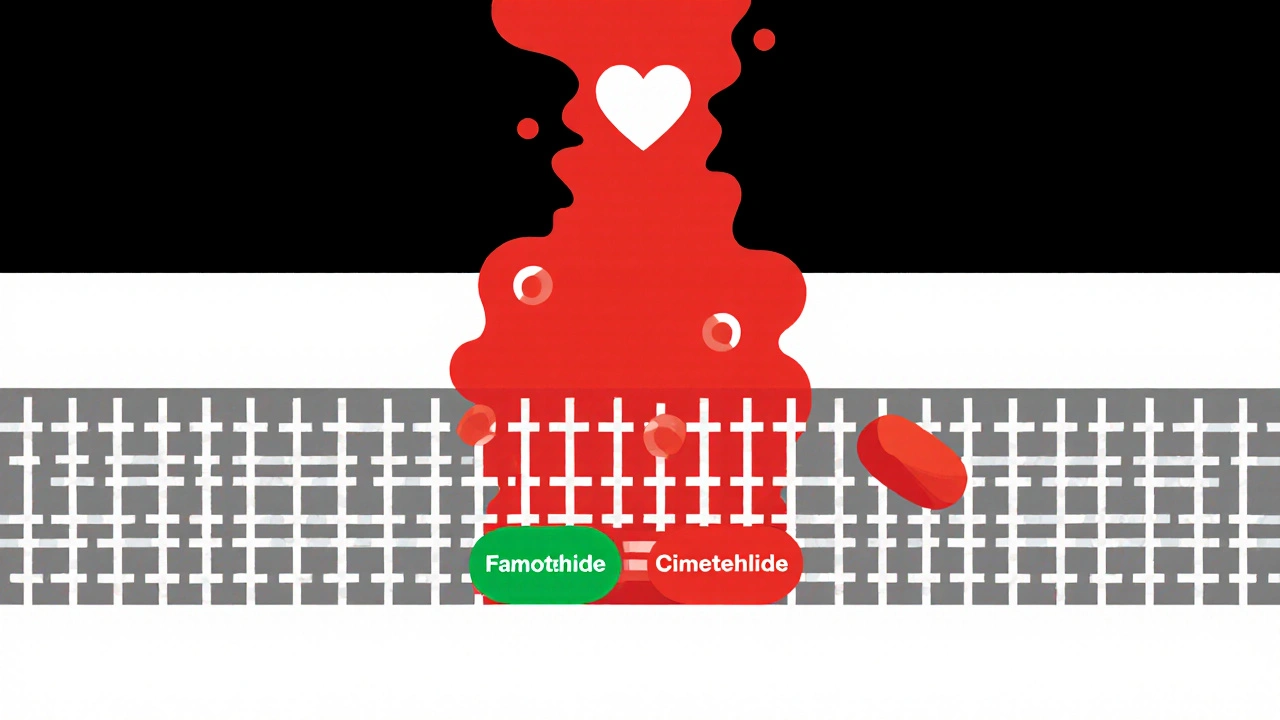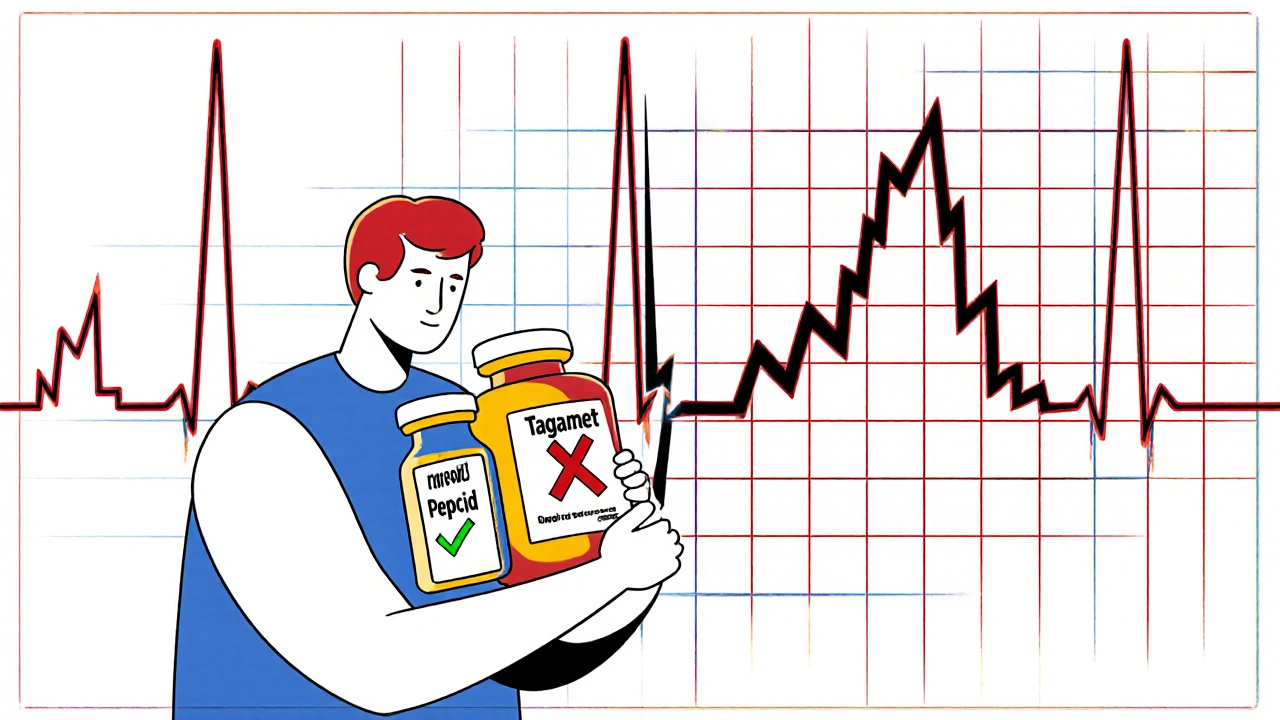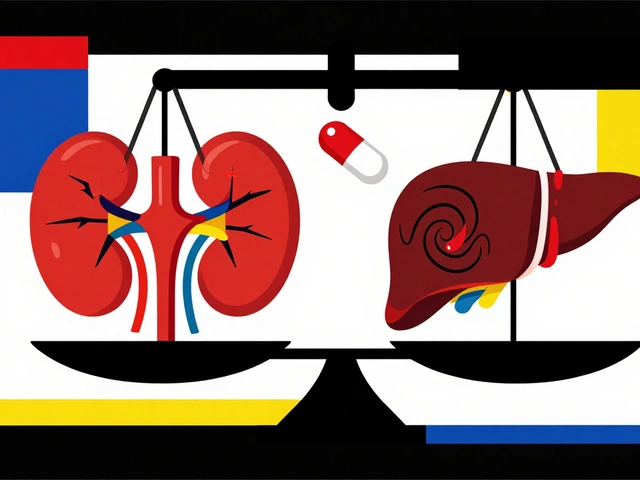Dofetilide Interaction Checker
Is Your Heartburn Medicine Safe?
Dofetilide (Tikosyn) is prescribed for irregular heart rhythms but has a very narrow safety window. Some heartburn medications can dangerously increase its levels in your blood, raising the risk of life-threatening arrhythmias.
This tool helps you check if your heartburn medication is safe to take with dofetilide. Based on the latest medical guidelines, we'll show you the risk level and necessary precautions.
Results
Enter your information to see safety results.
Two medications, one harmless for heartburn and the other for irregular heartbeat, can become a deadly mix when taken together. Dofetilide and cimetidine are both prescribed to millions, but when combined, they push the heart into dangerous territory - sometimes with fatal results. This isn’t a rare edge case. It’s a well-documented, high-risk interaction that cardiologists treat like a red alarm: never mix these two.
What Dofetilide Does - and Why It’s So Fragile
Dofetilide, sold under the brand name Tikosyn, is a Class III antiarrhythmic drug. It’s used to restore and maintain normal heart rhythm in people with atrial fibrillation or atrial flutter. Sounds straightforward, right? But here’s the catch: dofetilide has an extremely narrow therapeutic window. That means the difference between a helpful dose and a toxic one is razor-thin.
The body clears about 80% of dofetilide unchanged through the kidneys. It doesn’t rely on liver enzymes like many other drugs. Instead, it uses a specific transport system in the kidney tubules - a cation exchange mechanism that shuttles the drug out of the blood and into urine. This system is precise, efficient, and easily disrupted.
Because of this, even small changes in how the kidneys handle dofetilide can cause plasma levels to spike. And when that happens, the QT interval on an ECG stretches out. A prolonged QT interval doesn’t just look odd on a monitor - it sets the stage for torsades de pointes, a chaotic, life-threatening ventricular arrhythmia that can degenerate into sudden cardiac arrest.
Why Cimetidine Is the Problem - Not Other Acid Reducers
Cimetidine, sold as Tagamet, is an H2 blocker. It’s been around since the 1970s and was once a go-to for heartburn and ulcers. But unlike its cousins - famotidine (Pepcid) or ranitidine (Zantac) - cimetidine doesn’t just block stomach acid. It also jams the kidney’s cation transport system.
That’s the same system dofetilide needs to exit the body. When cimetidine is present, it blocks the transporters like a wrench thrown into gears. Studies show this can increase dofetilide blood levels by 50% to 100% within just 24 hours. That’s not a minor bump. That’s a full-blown overdose waiting to happen.
The FDA-approved prescribing information for Tikosyn says this interaction isn’t just possible - it’s predictable. In clinical trials, the risk of significant QT prolongation jumped from 3-5% with dofetilide alone to 12-18% when cimetidine was added. The American Heart Association’s registry data shows patients on both drugs are over four times more likely to experience dangerous rhythm disturbances.
Real Cases - When Theory Becomes Emergency
This isn’t abstract. Real people have been hospitalized - some have died - because this interaction was missed.
A 72-year-old man with atrial fibrillation was stable on dofetilide 500 mcg twice daily. He started taking cimetidine 400 mg twice daily for a stomach upset. Three days later, he went into torsades de pointes. He needed emergency cardioversion and ICU care. His QT interval had ballooned from 430 ms to 610 ms.
In another case, a 65-year-old woman took a single 300 mg dose of cimetidine for heartburn while on dofetilide. She passed out at home. Paramedics found her in polymorphic ventricular tachycardia. She survived - but barely.
Between 2010 and 2022, the FDA received 87 reports of QT prolongation and 23 reports of torsades de pointes directly linked to this combo. That’s likely just the tip of the iceberg. Many cases go unreported if they’re resolved quickly.

Why Famotidine Is Safe - and What to Use Instead
Not all H2 blockers are created equal. Famotidine (Pepcid) does not inhibit the renal cation transport system. Multiple studies, including those done during Tikosyn’s FDA approval, show famotidine has no meaningful effect on dofetilide levels.
If a patient on dofetilide needs acid suppression, famotidine is the clear choice - up to 40 mg twice daily. Proton pump inhibitors (PPIs) like omeprazole or pantoprazole are also safe alternatives. They work differently and don’t interfere with kidney transport.
Even a single dose of cimetidine can be dangerous. Dr. Anne B. Curtis from SUNY emphasized that as little as 48 hours of cimetidine use can trigger arrhythmias in someone on stable dofetilide. There’s no safe window.
How Clinicians Prevent This - And How You Can Too
Hospitals and clinics have learned the hard way. Today, most electronic health record systems automatically flag any attempt to prescribe cimetidine to a patient on dofetilide. Epic and Cerner systems require a cardiologist to override the warning - and even then, they must document why.
Before starting dofetilide, every patient gets a baseline ECG to check the QTc interval. If it’s over 440 ms (or 500 ms with bundle branch block), dofetilide is contraindicated. That’s non-negotiable. And part of that pre-screening? Asking: Are you taking any heartburn meds?
Patients need to know: if you’re on dofetilide, don’t take Tagamet - not even for a day. Don’t assume your pharmacist caught it. Don’t assume your doctor knows you’re using an OTC version. Many people still buy cimetidine over the counter, thinking it’s harmless.
Also, watch your potassium. Low potassium (below 3.6 mmol/L) makes QT prolongation worse. Keep potassium between 4.0 and 5.0 mmol/L. Eat bananas, spinach, sweet potatoes. Or take a supplement if your doctor says so.

Why This Interaction Still Matters in 2025
Cimetidine prescriptions have dropped from 28 million a year in the 1990s to just 1.2 million today. That’s good. But it hasn’t disappeared. It’s still used in hospitals for acute GI bleeding, in older patients who can’t afford newer drugs, and in places where electronic alerts fail.
The American Geriatrics Society’s 2023 Beers Criteria lists the dofetilide-cimetidine combo as one of the most inappropriate medication pairs for older adults. That’s because seniors are more likely to have kidney issues, take multiple meds, and use OTC drugs without telling their doctor.
Even with AI systems now predicting this interaction 72 hours before it happens, mistakes still occur. One 2022 study found that 12-15% of unexpected torsades cases in dofetilide patients were traced back to unrecognized cimetidine use.
This isn’t just about one drug pair. It’s a lesson in how tiny changes in kidney function - caused by something as simple as an antacid - can cascade into cardiac arrest. It’s why medication safety isn’t just about dosing. It’s about understanding how drugs talk to each other - and which conversations can kill.
What to Do If You’re on Dofetilide
- Never take cimetidine (Tagamet) - even if it’s OTC.
- Check all your medications - including supplements and cold remedies - for hidden cimetidine.
- Ask your pharmacist: Is this safe with Tikosyn?
- If you need acid relief, ask for famotidine (Pepcid) or a PPI like omeprazole.
- Get your QTc checked before starting dofetilide and every time your meds change.
- Keep potassium levels in the 4.0-5.0 mmol/L range.
- If you accidentally take cimetidine, call your cardiologist immediately - don’t wait for symptoms.
Can I take Tagamet if I’m on dofetilide?
No. Taking cimetidine (Tagamet) with dofetilide is absolutely contraindicated. It blocks the kidney’s ability to clear dofetilide, causing blood levels to spike by 50-100%. This dramatically increases the risk of torsades de pointes, a potentially fatal heart rhythm. Even a single dose can be dangerous.
Is famotidine (Pepcid) safe with dofetilide?
Yes. Unlike cimetidine, famotidine does not interfere with the renal transport system that clears dofetilide. Multiple studies confirm no significant change in dofetilide levels when taken with famotidine. It is the preferred H2 blocker for patients on Tikosyn.
How long does it take for cimetidine to affect dofetilide levels?
Significant increases in dofetilide concentration can occur within 24 hours of starting cimetidine. The risk of arrhythmia rises rapidly, and cases of torsades de pointes have been reported within 72 hours of cimetidine use in patients already on stable dofetilide.
What should I do if I accidentally took cimetidine while on dofetilide?
Stop taking cimetidine immediately. Contact your cardiologist or go to the nearest emergency room. You may need an ECG to check your QT interval and possibly blood tests to monitor potassium and dofetilide levels. Do not wait for symptoms like dizziness, palpitations, or fainting - by then, it may be too late.
Can I take other heartburn meds like omeprazole with dofetilide?
Yes. Proton pump inhibitors like omeprazole, pantoprazole, or esomeprazole do not interfere with dofetilide’s kidney clearance. They are safe alternatives to cimetidine for managing acid reflux or ulcers while on Tikosyn.
Why is this interaction so dangerous compared to others?
Dofetilide has a very narrow therapeutic window - even small increases in blood levels can trigger life-threatening arrhythmias. Cimetidine uniquely blocks the exact kidney pathway dofetilide relies on for elimination. No other common H2 blocker does this. The risk increase is predictable, large, and well-documented - making this one of the most dangerous drug interactions in cardiology.
If you’re on dofetilide, treat cimetidine like a landmine. It’s not just a bad combo - it’s a preventable emergency. Know your meds. Ask questions. Your heart depends on it.





Ravinder Singh
November 19, 2025 AT 02:05Wow, this is one of those posts that makes you realize how little we know about what we swallow daily. 🙏 I’ve seen patients on Tikosyn and never even thought to ask about Tagamet - turns out, I should’ve been asking EVERY TIME. Thanks for laying this out so clearly. I’m printing this out for my clinic’s med-reconciliation checklist.
Russ Bergeman
November 20, 2025 AT 23:13Okay, but… isn’t this just another overblown pharma scare? I mean, cimetidine’s been around since the 70s… why are we acting like it’s poison now? Also, why not just stop using dofetilide? It’s a nightmare drug. I’ve seen more harm than good.
Dana Oralkhan
November 22, 2025 AT 09:51This is terrifying… and honestly, so important. I have an elderly aunt on dofetilide, and she swears she’s fine with her ‘stomach pills.’ I’m sending her this right now - and I’m going to sit her down with her pharmacist tomorrow. People don’t realize how quietly dangerous OTC meds can be. Thank you for writing this. 💙
Jeremy Samuel
November 23, 2025 AT 17:37so like… cimetidine blocks the kidney thingy? lol i thought all acid meds were the same. i mean, tagamet? who even uses that anymore? like… did someone just dig this up from a 1998 medical journal? 🤷♂️
daniel lopez
November 24, 2025 AT 12:42THIS IS A BIG PHARMA COVER-UP. They let cimetidine stay on the market because they profit off of ICU stays and defibrillators. The FDA knew. The AMA knew. They just don’t want you to know that your $3 antacid is a cardiac time bomb. And guess who gets the bill? YOU. Wake up, sheeple. #PharmaLies #DofetilideCoverup
Nosipho Mbambo
November 26, 2025 AT 12:40Okay, but… why is this even a thing? Why not just ban dofetilide? It’s clearly too risky. And why is cimetidine still sold? It’s like they want people to die. Also, why does everyone keep saying ‘famotidine is safe’ like it’s some miracle drug? It’s just another pill. Nothing’s safe.
Katie Magnus
November 26, 2025 AT 15:35Ugh. Another ‘medical expert’ post. Like, who even uses dofetilide anymore? It’s so outdated. And cimetidine? That’s for grandpas who still think ‘heartburn’ means they’re dying. This whole thing feels like a 2005 blog post. 🙄
King Over
November 26, 2025 AT 23:04Tagamet bad. Pepcid good. Dofetilide dangerous. Don’t mix. Watch potassium. ECG check. That’s it. Done.
Johannah Lavin
November 27, 2025 AT 21:39My heart is racing just reading this… 😢 I had no idea. I’ve been on dofetilide for 3 years and took Tagamet once last winter for a bad stomach bug. I thought it was fine because it was ‘just one pill.’ I’m getting my ECG tomorrow. Thank you for this. I feel like I just dodged a bullet. 🙏❤️
Destiny Annamaria
November 29, 2025 AT 21:25As someone who grew up in a country where OTC meds are sold like candy - this is HUGE. In my hometown, people grab Tagamet like it’s aspirin. I’m sharing this with my community group. We need to get this translated into Spanish, Hindi, and Zulu. Lives are at stake. This isn’t just medicine - it’s public safety.
Ron and Gill Day
December 1, 2025 AT 18:42This is why you shouldn’t let ‘non-cardiologists’ prescribe anything. You think a GP knows what ‘cation transport system’ means? No. They just copy-paste prescriptions. And now we’re surprised people are dying? Pathetic. If you’re on dofetilide, you shouldn’t be allowed to buy anything over the counter without a 3-hour consult. Just ban all OTC meds for these patients.
Summer Joy
December 3, 2025 AT 14:12I can’t believe people are still using this drug. Dofetilide is basically a gamble with your life. And cimetidine? That’s the cherry on top. I had a friend die from this combo. They didn’t even know they were taking it. The hospital said ‘it was an accident.’ But it wasn’t. It was negligence. 💔
Aruna Urban Planner
December 5, 2025 AT 00:19The pharmacokinetic elegance here is almost poetic - dofetilide’s renal clearance via OCT2 and MATE1 transporters, precisely hijacked by cimetidine’s competitive inhibition. The narrow therapeutic index isn’t just a clinical footnote - it’s a biological vulnerability engineered by evolution. This interaction isn’t random; it’s a systemic failure of polypharmacy awareness. We treat drugs as discrete entities, but the body is a network - and cimetidine is the node that collapses the whole graph. The solution isn’t just substitution - it’s systemic re-education. We need to teach patients that ‘harmless’ doesn’t mean ‘innocent.’